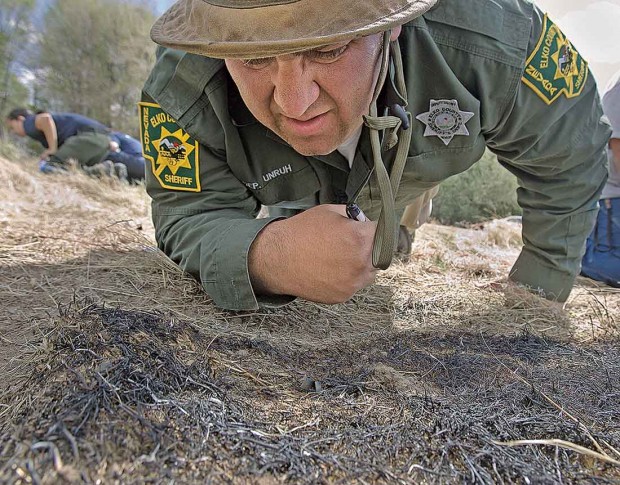May 22, 2012 — Originally published in the Elko Daily Free Press
ELKO — The facts, at the outset, were few. A fire had charred the ground, although the cause was unknown.
A lady was camping out of her Jeep Cherokee, hanging out right next to the burn drinking whiskey from a bottle with her small dog on a pink leash.
She even managed to intimidate some of the firefighters.
“She freaked us out,” said Elizabeth Gameros, a volunteer firefighter with Storey County since 2007.
The lady wasn’t really crazy and the fire didn’t get out of control because it was set by firefighters as part of a week-long class in fire investigation.
The northern Nevada area is bereft of enough fire investigators and Greg Liddicoat, who was leading the class, wanted everyone to succeed.
Investigating fires is a system, not magic. It is structured so that every fire investigation goes the same way, every single time.
“It’s a systematic methodology,” he said.
Liddicoat said he wanted the students to come away with one thing, more than any other. He wanted them to be able to do a fire investigation the same way time and time again.
“Once you learn it (the system), it becomes easy,” he said.
If they could teach that to their fellow firefighters, fellow police officers, fellow deputies and coworkers, they had probably learned the system right.
“I love this,” Liddicoat said. “I’ve been doing it for 33 years.”
The crazy lady kept on sitting in her chair, her dog wrapping itself around the legs of one of the students who was trying to figure out what she knew and saw and whether she started the fire or could lead him to who did.
Wading through the ashes
The role-playing scenario was part of the fourth day of the fire investigation class. It was meant to take the ducks out of the water and put them in the ashes of a brush fire.
Don Unruh was one of those ducks, or more aptly, one of the deputies with the Elko County Sheriff’s Office, taking the class. Because part of his job is to interview subjects, he wasn’t allowed to do the talking. It was his forte.
Instead, he would be getting down on his hands and knees and searching, often with a magnifying glass, through the remains of the fire.
The class has changed Unruh’s entire outlook on his job.
“I wish I could apply this to cases I’ve already had,” he said, referring to the methodology of the class.
The class, Unruh said, was about investigation, but investigation through a system, often of documentation.
“Document, document, document and map the points,” he said.
“I’m going to apply the methods, procedures and documentation” as a deputy, he said.
The class forces the students to think about even the “tiniest details,” he said.
“It really enforces the need not to shoot from the hip,” he said.
Unruh will be applying the methods he’s learned as an often-times first responder to fires.
“We’re usually the first or second on scene,” he said.
Goodbye, comfort zone
Unruh soaked up the instruction and the methodology and so too did Gameros. She, on the other hand, had to interview the crazy lady and exit from her comfort zone of heat and light and ash to whiskey, people and a small dog.
The crazy lady who freaked Gameros out was actually Liddicoat’s wife, playing crazy for the day, to help the students deal with a real-life scenario.
“It’s good to role-play to get used to dealing with these people,” Gameros said.
Gameros liked the class just as much as Unruh and said she, much like him, will be able to go back to her department and teach the system and methodology she learned.
She already teaches CPR and first aid and now she can add fire investigation to the list.
“I want to help out the (Storey County fire) department,” she said.
If nothing else, the class has been an incredible experience for her.
“I’ve learned so much in the past week,” she said. “The hands-on element is amazing.”
Arsonists, negligent parties beware
“We’re really short,” Elko City Deputy Fire Chief Mike Hecht said. “We’ve only got three (investigators) in the whole area.”
The class will produce more investigators, though it may take up to two years before these students can graduate to investigating fires on their own.
The students must go with one of the current three investigators to a series of fires and get their task books signed off on, Hecht said. The complexity of the fire determines how many more they must go on.
“We won’t have to pull (an investigator) from Battle Mountain or Winnemucca,” he said.
Hecht was co-teaching the class.
Arsonists who don’t want to end up in jail aren’t the only ones who need to realize that fire investigation is a serious matter.
By the policies of most agencies, most fires need to be investigated, Greg Liddicoat said.
“Where the fire starts determines who picks up the bill,” he said.
Fire investigation, and the classes, have been evolving and growing stronger because of the increased costs of fighting fires and the necessity of finding out who will be paying for them.
And if the fire is human-caused, the party may very well be liable for the cost of the fire fighting.
“It’s not getting cheaper,” Liddicoat said. “Negligence can lead to a bill,” he said.
———
Burning Questions: course teaches how to investigate a fire as a PDF
